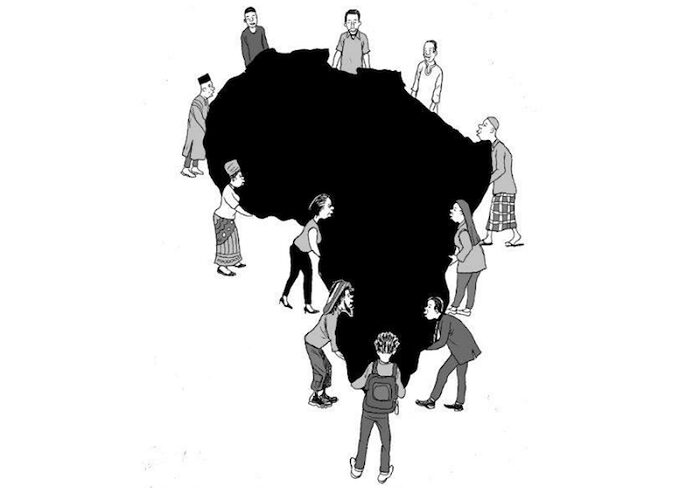I started with a study of a student’s story history! If he was not among the brightest in his class, I would have suspected him of voluntary autism! But I read in his notebook that before colonization, Africans lived in perfect harmony? In a cultural, spiritual homogeneity…
In a Garden of Eden desecrated by colonization. Cheick Anta Diop himself had a less idyllic and more scientific reflection. More recently, according to this book of stories, the West has deteriorated the prices of raw materials to impoverish Africa. I spare you the in-between of these cut-off stories.
I was shocked! Rime what? Did the history teacher not have enough time to explain to the children that some Africans have sold their “brothers” for bottles of brandy? Had he not enough time? Did he have so little time to fail to explain that after colonization the story continued? That generation of “founding fathers & co” has plundered and plundered our countries, throwing away the contents of seas, lands, soils, and subsoils? That putschists of every hair and hair have seized the state apparatus here and there? That there have been more than 80 coups d’état in Africa, notably in Nigeria – which has never been a French colony? That in their ecstatic delusions, some opponents surprised to come to power, have mistakenly confused the cashier of the State with their piggy bank? That…
Okay! It is difficult to summit history, and in all rigor, impossible. But there is a minimum of nuances and precisions that must be explained to learners. It is necessary to clearly distinguish the factual from the abstruse personal comments. Alas, we (stories) tell stories to our children… to their history lessons! For information, this teacher would be assiduous of a television channel propagandist of a certain Africanism, of which he is often inspired (underscore the euphemism) in his teachings.
But what is his Africanism to him, this illuminated teacher of stories? For the multiple Africanisms are differences of degree between the two poles of emotivist Africanism and rationalistic Africanism. To commemorate slavery, to claim sovereignty over natural resources, to question monetary dependence, to preach national or continental preference, to advocate cultural re-valorization, a return to its origins, authenticity… all fields in which opinions always converge towards one of these two poles, which reveal the diversity of Africanist approaches.
Sleeping on slavery? It’s good, it is good. Triangle treaty, triangular trade… yes, we must teach our children; but how? With all the scientific rigor accumulated over the centuries to address historical issues. But also and above all, we must draw from them mature teachings, reflective conclusions, and practical lessons capable of illuminating the future. Joseph Ki-Zerbo and other scholars have said this in a thousand ways: the past, history must enlighten the present and guide the future. But no! History cannot, and must not be enlisted by revisionists or simple incompetents, victims of their credulity or their fantasies!
These improvised nurses who should refuse the dressings of history must be extirpated from the ranks of serious teachers who devote themselves skilfully but intelligently to their profession.
In addition to expurgation, it is also necessary to examine the teaching programs: what are we taught to our children? Elsewhere, any reform of the school system is criticized and debated, defended or disapproved by personalities on all sides. There are countries where there is even debate on the solar system or on secular evidence.
In short, here we need a public debate on this issue, as on so many others. A real debate would allow young people to broaden their vision of the future of the continent. It is all too easy to stay in the coat of the victim of a bloody past. Besides, it’s a half-truth. The proverb says that the heir of the leopard also inherits its spots!
We must get out of the historical shackles, free the spirits. We must know the (real) past, we must above all project ourselves! Watering the past with warm tears will not flourish in the future.
African youth, presented as the hope of the continent, needs tangible reasons to hope. The future has to be done. Immense challenges await the continent. And young people, on the front line, will have to dare to build the future on their cultural and historical ground, however painful. We must stop falsifying and watering history. We must open up tomorrow. We are free to do it! But as Victor Hugo said: “Liberty begins where ignorance ends”.
